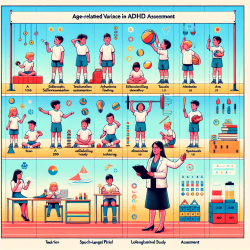Understanding Age-Related Variance in ADHD Assessment
As professionals dedicated to enhancing the lives of children, it is crucial to base our practices on data-driven insights. The research article "Age-Related Variance in Performance versus Ratings of Attention and Impulse Regulation in Children: Implications for the Assessment of ADHD" offers valuable findings that can refine our assessment techniques for ADHD.
Key Findings from the Study
The study explores the relationship between executive function (EF) task performance and parent ratings of attention and impulse regulation in children aged 8 to 20. The research highlights that while EF task performance improves significantly with age, parent ratings on the SWAN scale show minimal age-related changes. This discrepancy suggests that EF tasks and behavior ratings may not measure the same constructs, particularly in developmental contexts.
Implications for Practitioners
These findings underscore the importance of considering age-related variance when assessing ADHD. Here are some key takeaways for practitioners:
- Developmental Trajectories: Recognize that EF tasks and parent ratings follow different developmental trajectories. EF tasks show rapid improvement in early childhood, while parent ratings remain relatively stable.
- Assessment Methods: Use a combination of EF tasks and behavior ratings to obtain a comprehensive understanding of a child's self-regulation abilities. This dual approach can help identify discrepancies between structured task performance and real-world behavior.
- Age Considerations: Be mindful of age-related differences when interpreting assessment results. Younger children may show more pronounced improvements in EF tasks, while older children may not exhibit significant changes in parent ratings.
Encouraging Further Research
While this study provides valuable insights, further research is needed to explore the relationship between EF tasks and behavior ratings across different contexts and populations. Practitioners are encouraged to engage in research initiatives that investigate these dynamics, contributing to a more nuanced understanding of ADHD assessment.
To read the original research paper, please follow this link: Age-Related Variance in Performance versus Ratings of Attention and Impulse Regulation in Children: Implications for the Assessment of ADHD.










